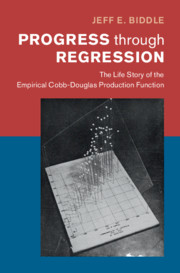Book contents
- Progress through Regression
- Historical Perspectives On Modern Economics
- Progress through Regression
- Copyright page
- Dedication
- Contents
- Figures
- Acknowledgments
- Introduction
- Part I Paul Douglas and His Regression, 1927–1948
- 1 The Origins of Douglas’s Production Function Research Program and His Initial Time Series Studies
- 2 The Douglas–Mendershausen Debate and the Cross-Section Studies
- 3 Theoretical and Econometric Challenges of the Early 1940s, and Douglas’s Final Word
- Part II The Diffusion of the Cobb–Douglas Regression
- Part III Conclusion
- References
- Index
- Historical Perspectives On Modern Economics
3 - Theoretical and Econometric Challenges of the Early 1940s, and Douglas’s Final Word
from Part I - Paul Douglas and His Regression, 1927–1948
Published online by Cambridge University Press: 30 October 2020
- Progress through Regression
- Historical Perspectives On Modern Economics
- Progress through Regression
- Copyright page
- Dedication
- Contents
- Figures
- Acknowledgments
- Introduction
- Part I Paul Douglas and His Regression, 1927–1948
- 1 The Origins of Douglas’s Production Function Research Program and His Initial Time Series Studies
- 2 The Douglas–Mendershausen Debate and the Cross-Section Studies
- 3 Theoretical and Econometric Challenges of the Early 1940s, and Douglas’s Final Word
- Part II The Diffusion of the Cobb–Douglas Regression
- Part III Conclusion
- References
- Index
- Historical Perspectives On Modern Economics
Summary
This chapter first looks at important theoretical and statistical critiques of Douglas’s production function research that appeared during WWII. A theoretical line of criticism used neoclassical models to infer what relationship, if any, would exist between parameters of firm production functions and the coefficients estimated by Douglas. A critique from the perspective of the Cowles Commission econometric research program was provided by Marschak and Andrews. The Marschak and Andrews article can be read as a devastating criticism of Douglas’s work, a list of problems that fatally marred the program, but their tone suggested a different conclusion: that Douglas’s pioneering vision of statistically estimating the key relationships of neoclassical value and distribution theory could be realized, given better data and the methods of the Cowles econometricians. The chapter also analyzes Douglas’s 1947 AEA presidential address, which reveals his own understanding (as opposed to that of his coauthors and those who reacted to his work) of what he had accomplished with his 20-year research program.
Keywords
Information
- Type
- Chapter
- Information
- Progress through RegressionThe Life Story of the Empirical Cobb-Douglas Production Function, pp. 105 - 142Publisher: Cambridge University PressPrint publication year: 2020
